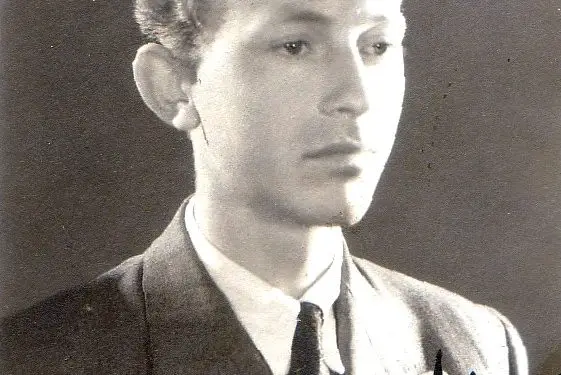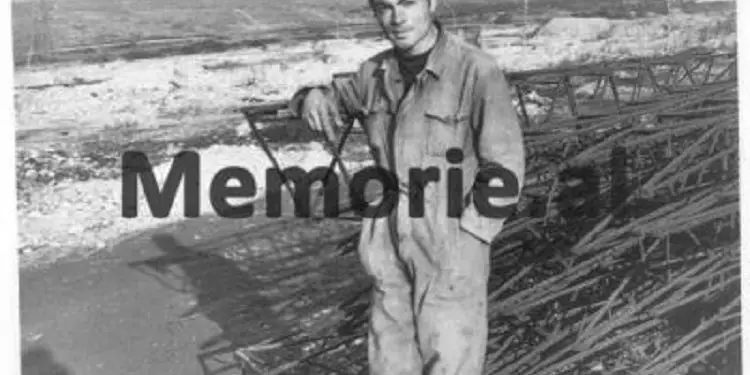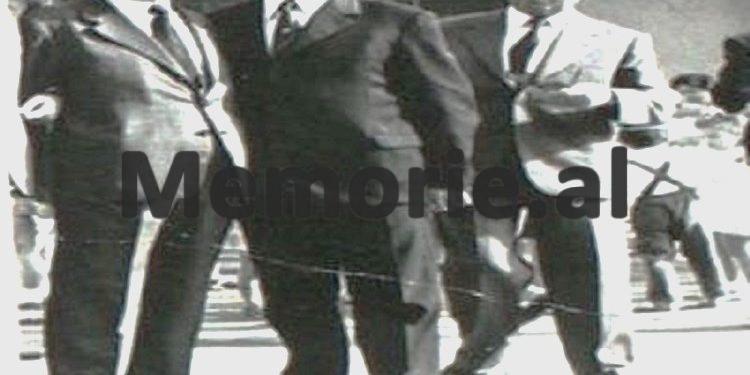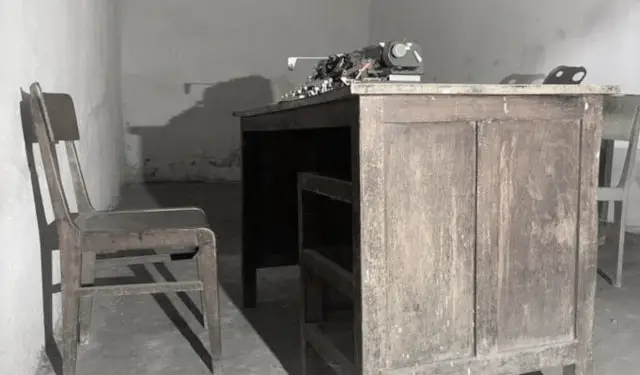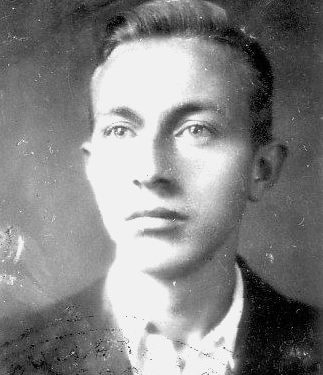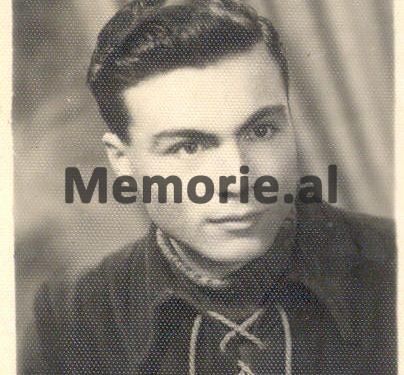By Uran Kalakulla
Part Six
Nazism and Communism
Memorie.al / Nazism lasted 12 years, while Stalinism lasted twice as long. In addition to many common characteristics, there are many differences between them. The hypocrisy and demagogy of Stalinism was of a more subtle nature, which was not based on a program that was openly barbaric, like Hitler’s, but on a socialist, progressive, scientific and popular ideology, in the eyes of the workers; an ideology that was like a convenient and comfortable curtain to lie to the working class, to lull the sharpness of intellectuals and rivals in the struggle for power.
One of the consequences of this peculiarity of Stalinism is that the entire Soviet people, its best, most capable, hardworking and honest representatives, suffered the most terrible blow. At least 10-15 million Soviets lost their lives in the torture chambers of the KGB, martyred or executed, as well as in the camps of the gulag and others like them, camps where it was forbidden to correspond (in fact they were prototypes of the Nazi death camps); in the mines in the ice of Norilsk and Vorkuta, where people died from cold, from hunger, from crushing work in countless construction sites, in the exploitation of forests, in the opening of canals and during transportation in inflatable wagons, or in the flooded barns of the death ships.
Continued from the previous issue
The first investigation
First, they took me to the office of the guard officer, a small room at the entrance to the Branch. I never saw Tanush and the other two again. The officer, a young man, after searching me everywhere, took my wallet with 2,800 ALL at the time (my only possession at the time), my wristwatch, my fountain pen, my pack of cigarettes, along with my lighter, my belt, my tie, my shoelaces, my small pocket comb, my handkerchief.
And he recorded all of this in a kind of notebook, then wrapped it all in my handkerchief and put it on a small shelf behind him. Then he drew up a kind of sleuthing process, read it to me and told me to sign, that the seized items were complete. Up to this point, the work went well. But would he continue like this, calmly, without cursing, without insults and especially without beatings and torture? That was the question…!
Once this was done, two policemen grabbed me by the arms and led me through a dark corridor, which seemed to me like the basements of the Colosseum in ancient Rome (which I had seen in engravings), and straight into a large room, also dark, with boarded-up windows and a blinding electric light.
In the middle of that room they sat me down on a metal chair, fixed to the cement floor, in front of a row of tables, also fixed to the cement. I even noticed that the cigarette butts were fixed to those tables. Then, even though I had no personal experience with such work, I began to understand that embedding these furnishings meant removing any opportunity for the defendant to use the chairs, tables, and cigarette ashtrays as weapons of defense or attack.
And it seemed to me, without looking, a logical measure! Although I, as a person, would not have even thought of such a countermeasure. Behind those tables and in front of me, were a row of Branch agents, some in officer uniform, the others mainly in civilian clothes. And at the head of them, at a special table, which formed the head of a T, sat a burly man, to whom his subordinates, stood ready. It was clear that he must be the head of the Branch.
The first minutes passed in silence. I looked at them and them at me. It was like a kind of mutual, silent examination, as if to get to know each other in advance, as if to measure our strength, before the match began. It was as if we were in a boxing or karate ring: me alone against a whole team of wrestlers or boxers. And I, thin and weak, they, at least some of them, like perfect bulls. Then the “dialogue” began, certainly not at all equal, but with a very visible inferiority to my disadvantage. But do you mean after this dialogue or during it, would the physical fight also intervene, with fury?
Did I begin to feel fear? Of course. This is more than human. Don’t even the beasts of the forest have it, when they see that they are threatened by immediate danger? I have seen in documentary films that even the lion or tiger of the jungle, for example in India, when they hear the tambourines of the hunters in their den and catch sight of the large crowd of them with weapons in their hands, snarl, lower their proud head and, worried, abandon the den and drag themselves away to hide in the deepest possible depth of the jungle. What about me, who was neither a lion nor a tiger, but very much a kind of coward, cowardly and alone in that entire kennel?
I don’t know if bravery is a weapon always ready in the hand of man, at least in that man who neither feels himself a coward nor is known as such. But I know, however, one thing for sure, that in a man with dignity, this quality of his, tested in every case and circumstance, never abandons him. So, is dignity the basis of bravery or a synonym for it?
To be honest, I didn’t know at all whether I was brave or not, but dignity has always been a feeling very dear to me, almost above any other human feeling. And I have tried to keep it in my soul all my life, regardless of age, time and circumstances, no matter how difficult they may have been. And I want to say openly that, if there is anything I allow myself to be proud of, it is precisely the fact of never abandoning this feeling.
And the debate began. The first to open his mouth was one of the guys I had right in front of me. It seems that he was assigned to start the conversation first:
– “What is your name”?
– “So-and-so…”
– “Tell us, defendant, what did you do today, from morning until the moment of your arrest”?
– “I was at school all morning. In the afternoon, until six o’clock, I was at home. After that hour, I went for a walk with my friends”.
– “Who are they”?
– “I don’t know why you’re asking me about this, because you already know. They are the ones you arrested me with”.
– “Hm, why are they the only friends you have”?
– “Of course not, I have plenty of friends, work colleagues, other young people.”
– “Who were you expecting at your house at two o’clock today?” – Suddenly jumped up, getting straight to the point, the one who was supposed to be the head of the Branch.
– “No one. After lunch, like so many other times, my friend Tanushi, with whom you brought us here at once, came.”
– “What about someone else?”
– “No one else”!
The head’s intervention burned me deeply. He knew that someone had to come to me at two o’clock. That is, that someone had spoken. Who could it be? Those two from Durrës? Why, have they really been arrested? Or someone from our group, who knew everything? Fluctuating between hypotheses, in order to discover the truth as best you can, is a real torture. It shocks you and tires you a lot.
It is even the first step, which separates resistance from taking off your panties, to put it bluntly. To deny a fact that does not hinder your work at all is sheer stupidity, but to accept even a simple fact that is related to the main, essential problem is to start digging your own grave with your own hands.
When you are alone in a job and have no collaborators, not even a single one, it is much easier for you to defend yourself before the investigation, of course when they have no facts. But when you are with friends, it is very difficult, because you do not know what your friends have said, how capable they are, to withstand numerous, persistent questions, thanks to various pressures, up to animalistic beatings and deadly torture?! And there is no greater misfortune, especially when you try to defend yourself, as best you can, with tooth and nail, and the other has sold you, along with himself, like meat roasted in a cauldron, ready to be eaten!
So the trouble is that you do not know how your friends have stood, so that you can model your position. There is no greater torture for the mind and soul, than not knowing the position of your friends, in the investigation. And I am not talking here at all about investigations like these today, where, it seems to me that something is respected in the defendant, I do not know how much or how. I am talking about the communist investigation, of course, where a person was not worth a penny in its eyes! They would kill you and not pay you, as a well-known Albanian expression says.
From the first moments, in that semi-dark room, the question hit me like a hammer: would I be able to get out of that haunted room alive? I felt a shiver down my spine. The peripheral nervous system, the parasympathetic one, seemed to start reacting. Was it the body’s own preparation, to face what was to come next? I had also heard about the very bad reputation of that anteroom, especially during the “time of Koç”, about the horrors of two Sigurimi men, very well-known at that time, who had brought terror to Tirana, about Skënder Kosovë and Skënder Konica, these two Skënders who bit people, like two skunks, guard dogs of mythological hell.
These “skunks-skunks”, the all-powerful lords of life and death of the citizens of Tirana at that time. They showed that the walls of that room were splattered with blood and human brains. They told how tortures were carried out, turning the radio to maximum volume, so that the victims’ cries and screams could not be heard outside the ominous building.
They told what people at that time did not tell, but those who listened not only turned pale as a bird, their legs trembled, but their breath was also lost. It was almost as if the night had suddenly come to you, even from afar, while you were walking alone by the city’s graves. The fate of many of these “skendera-kerbera” is known and has to do with the very duration of dictatorial regimes.
As if by a secret law of history, the dictator himself often eliminates from the face of the earth the most loyal and cruel executioners in his service. Apparently, over the years, under the pressure of new conjunctures, the dictator himself, this devil as black as hell finds it necessary or almost necessary, as if to whitewash him, to appear white, to eliminate some of the vanguard of his criminals.
Hence the famous expression (now exaggerated), that; “the revolution, in time, begins to eat its own puppies”! In fact, didn’t this happen in the French Revolution, in 1789-1793? Didn’t it happen, similarly, with the Bolshevik Revolution and, especially, with the rule of Stalin? Didn’t it happen, similarly, during the rule of Enver Hoxha? Just the following names (of course they are not all), I believe would be very meaningful evidence: Koçi Xoxe, Lieutenant Baba, Nevzat Haznedari, Mehmet Shehu, Kadri Hazbiu, Feçorr Shehu, Kopi Niko, Mihallaq Ziçishti, and lots and lots of their friends.
But let’s continue with my preliminary investigation. Now, confined to the metal chair, I was attentively observing the row of masks of my first investigators. Of them, I knew only Major Besim Selita before, who arrested me. His colleague (it seems the closest), a mask with a stout body, with a pair of moustaches like those of the Tsar’s gendarmes (as I had seen in Soviet films), rushed at me arrogantly, insulting me and telling me that I had been an enemy since 1945, when I was just a high school student, at the age of 16. And, in this accusation, by faith, he was absolutely right!
In that gallery of masks, although I was in great distress, I noticed that they did not seem to have an ordinary human color. The color of their faces, brought to mind that of copper, when it rusts: a color between yellow and green, like the corpses of the dead, when the process of decomposition begins. Something very gripping, macabre. It was clear that they seemed to be beings that had come from the graves, chosen emissaries of death, to bring new victims to that immense, never-satisfied pit! And I felt for them as much hatred, as much disgust, as much as I felt like pulling out my intestines.
And the interrogation continued. It seemed that the Sigurimi team wanted to surprise me with their incessant questions, now one and now the other. But I did not lose my temper at all. My mouth worked like a whistle and I was, as they say, a jackass. So they could never catch me contradicting myself: I decided to follow a line, without any hesitation, without any deviation. And, to tell the truth, it seemed to me, strangely enough, as if I were triumphing over my inquisitors.
Meanwhile, the head of the Branch said almost nothing. It seems that he had intended to let his “hounds” bark and gnash their teeth as much as they could (while he remained, like a professional hunter), so that they would lead the game to his path and, only then, he would fire his gun.
Out of the corner of my eye, I noticed one of the improvised investigators’ wristwatches. It was approaching eleven. So, I must have had a good four hours under that torture, in that mental, spiritual, and verbal torture. My mouth was dry, but I felt neither hunger nor thirst. In fact, I couldn’t even think of a cigarette. When, at that moment, the door opened with a bang and in came, all sly, a short man: a face as big as a stale bun, but with fierce eyes, like those of a sphinx.
All the agents who were there, including the chief, stood up with a bang and stood ready. Who was this new face? I didn’t know him at all. I was ignorant of the work of the Sigurimi people. But it was clear, from the reception they gave him, that the subject must have been some big boss of theirs, one of the Ministry’s.
Not Kadri Hazbiu, whom I knew from the photographs of the bureaucrats, but perhaps his first assistant, Mihallaq Ziçishti. And I had really hit the nail on the head, as I learned a little later, when the chairman mentioned his name. When he entered, he addressed the chairman with the question:
– “Is this it, do you understand?”
– “What do you order, comrade Mihallaq”!
– “Okay, continue, because I want to hear what this dog has to say.”
And the debate began where we had left off. Meanwhile, “Llaqka”, who had taken a seat closer to me, on a chair that was hastily brought to him from outside, in an instant got up from his seat, cursed at me in my mother’s name and punched me in the jaw with his fist, until a molar tooth broke and my mouth bled. I felt my soul catch fire. It wasn’t so much pain, but indignation, the rage that gave me courage. The indignation that cursed at me in my mother’s name. And I turned to him in revolt: – “Shame on you, good general! My mother is seventy years old. And she is an Albanian mother. I would never insult you with such an expression! Not even these, your colleagues, although they are your subordinates, have ever insulted me by calling me mother”!
For my revolt, I was expecting the apocalypse to happen. I expected, for example, that the dogs there, even more strongly than out of anger, to show their zeal for their great superior, would suddenly jump on me, to tear me apart. But to my surprise, no one moved from their place. Even “Llaqka” himself stood up, pulled his chair closer to the table, turned his head a little and looked at me, I would not say regretful for the gesture and the words spoken, of course, but somehow more subdued, more attentive to the debate that continued after that pause, as if nothing had happened.
And after about half an hour he got up and snapped his neck, just as he had come. And at that moment a thought occurred to me in the form of a question: could these little dogs have been less cruel than the tigers of their leadership? And the debate continued. The clock was now approaching one after midnight. The members of that table began to leave one after another. And in the end only the chairman remained, who, as before, spoke very little, but did not take his eyes off me, almost for a moment. It seems that he had set himself the task of examining me with his eyes, as a kind of purely psychological observation. But I knew psychology much better than he did, in fact.
At one point, it seems he got tired too, and then he addressed me with these words:
– “Why, did we arrest you in vain”?
He said this and took a piece of paper from his desk and showed it to me from a distance of, say, a meter, and continued:
– “Here is the telegram that the general received from Durrës, with your names”!
I squinted my eyes and I really managed to see two names very clearly on the telegram: Uran Kalakulla and Tanush Kaso.
“Ah”, – I said to myself, – “Zeqir Koçi, you son of a bitch”!
It was now proven that the denunciation had come from that scumbag, because he alone could not tell me my name exactly, but always made the u an “O”. /Memorie.al




